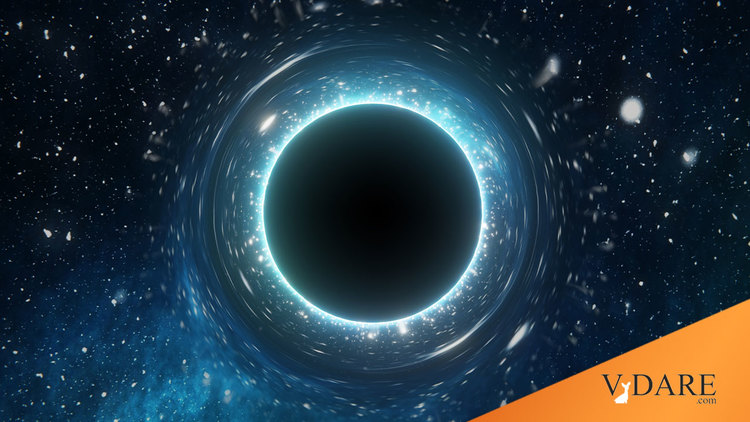


By Steve Sailer
06/22/2021
From the Cornell University course catalog:
ASTRO 2034 Black Holes: Race and the Cosmos
Course information provided by the Courses of Study 2020-2021.Conventional wisdom would have it that the “black” in black holes has nothing to do with race. Surely there can be no connection between the cosmos and the idea of racial blackness. Can there? Contemporary Black Studies theorists, artists, fiction writers implicitly and explicitly posit just such a connection. Theorists use astronomy concepts like “black holes” and “event horizons” to interpret the history of race in creative ways, while artists and musicians conjure blackness through cosmological themes and images. Co-taught by professors in Comparative Literature and Astronomy, this course will introduce students to the fundamentals of astronomy concepts through readings in Black Studies. Texts may include works by theorists like Michelle Wright and Denise Ferreira da Silva, authors like Octavia Butler and Nalo Hopkinson, music by Sun Ra, Outkast and Janelle Monáe. Astronomy concepts will include the electromagnetic spectrum, stellar evolution, and general relativity.
When Offered Spring.
Distribution Category (LA-AS, ALC-AS, PHS-AS)
Enrollment InformationSyllabi: none
Regular Academic Session. Combined with: COML 2034
3 Credits
Stdnt Opt20768LEC 001
M11:25am — 12:40pm
Online Meeting Feb 8 — May 14, 2021
Battaglia, NVaziri, P
From City Journal:
Even the hard sciences are no longer immune to the ongoing racial hysteria.
Heather Mac Donald
June 21, 2021“Black Holes: Race and the Cosmos” asks the question, “Is there a connection between the cosmos and the idea of racial blackness?” Anyone familiar with academia’s racial monomania knows the answer: of course there is! Though “conventional wisdom,” according to the catalog description of “Black Holes: Race and the Cosmos,” holds that the “‘black’ in black holes has nothing to do with race,” astronomy professor Nicholas Battaglia and comparative literature professor Parisa Vaziri know better.
Battaglia and Vaziri puncture the “conventional wisdom” by drawing on theorists such as Emory University English professor Michelle Wright. Wright’s book, The Physics of Blackness: Beyond the Middle Passage Epistemology, invokes “Newton’s laws of motion and gravity” and “theoretical particle physics” to “subvert racist assumptions about Blackness.” The Cornell course also studies music by Sun Ra and Outkast to “conjure blackness through cosmological themes.” …
What’s different about “Black Holes: Race and the Cosmos” is its co-listing in an actual science department. The course fulfills Cornell’s science distribution requirement, touching as it does on such concepts as the electromagnetic spectrum. It is not surprising that astronomy would be an early adopter of race theory, and that Cornell would lead the way. Many astronomy departments have been on the forefront of campus identity politics, eliminating the physics GRE as a requirement for graduate study, for example, on the ground that it has a disparate impact on female, black, and Hispanic students. Cornell’s astronomy department will not even allow prospective graduate students to submit the general GRE or the physics GRE. Cornell’s engineering department accepts female undergraduates at over two and a half times the rate of male students, to yield an engineering class that is majority female. This is hardly an accident. Twice as many male as female intending engineering students apply for admission; the average male math SAT score is significantly higher than the average female score, and males predominate at the upper reaches of the curve.. …